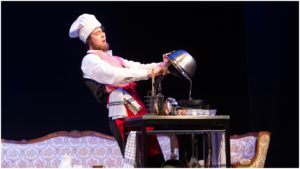
Wexford Festival Opera 2019 Review: Doctor Miracle
A Fun Production Starring A Magnificent Omelette
By Alan Neilson(Credit: Paula Malone)
In 1856, the 18-year-old Georges Bizet won joint first prize in a competition for an opéra comique to be played at Offenbach’s theatre, the Bouffes-Parisienes, with a one act operetta, “Doctor Miracle.”
The work was premiered in 1857, received 11 performances, and was then forgotten until it was revived in 1951. Lasting around one hour, with a cast of four singers and an omelette, it is an ideal choice for one of Wexford’s opera shorts, which took place during the afternoon at White’s Hotel.
An Omelette
Set in Padua, it relates Silvio’s attempts to deceive the Mayor into accepting him as a husband for his daughter Laurette. The Mayor, of course, wants nothing do with Silvio as he hates military men, and would prefer anyone to a soldier as a son-in-law.
Having disguised himself as servant, Silvio finds himself inside the Mayor’s house. To everyone’s delight he prepares an omelette, the real star of the show! Unfortunately, he is discovered and thrown out of the house, although not before leaving a note informing them that the omelette has been poisoned.
Doctor Miracle arrives (Silvio in disguise once again) with a cure, but which he will only provide if he can marry Laurette. The terrified Mayor agrees, Silvio then reveals himself, claims his bride and tells everyone that the omelette was not, in fact, poisoned. The Mayor, outwitted, is resigned to the situation.
Using an excellent English translation, which played up the comedic elements to the fullest, director Roberto Recchia, aided by costume and set designer, Luca Dalbosco, created a hugely entertaining, fast-moving and genuinely funny presentation. The simple set consisted of a table, chairs, and a portable cooking unit for making the omelette. It was all very simple, and all very effective. The cast engaged enthusiastically and energetically with their roles, sang well, and hammed up the presentation of their dialogue, of which there was plenty. Most importantly, they appeared to be really enjoying themselves.
Having A Blast
In the role of Laurette was soprano Lizzie Holmes, who gave an excellent performance. She sang clearly and articulately, her sweet sounding voice imbued with a purity and expansive quality that allowed her voice to shine. Her phrasing was precise and secure, and captured both the comedy and the frustrations she had to experience.
Silvio was played by tenor Guy Elliot, who moved easily between his disguises and whose larger-than-life characterizations did much to ensure the work’s success. He actually managed to cook the omelette while he was singing, and tossed it successfully, much to the delight of the audience. His singing was very expressive, always with an eye to eliciting an extra laugh. The voice was secure, with a pleasing tone.
Baritone Simon Mechlinski was cast as the Mayor, who also has a natural instinct for comedy, but in this case was used to send up the Mayor, who came across as gullible and fairly dim-witted, but with a high opinion of his own status. His excitement at the arrival of the omelette was ridiculous, and very amusing. Mechlinski’s voice is strong and well-focused with a warm, appealing timbre.
The Mayor’s wife Véronique was essayed by mezzo-soprano Kasia Balejko. A smaller role than the others, with fewer opportunities to show off her skills, she nevertheless made the most of the opportunity, putting in a solid, confident performance.
It was in the ensemble pieces that the work really came alive, especially in the “Omelette quartet” in which they laud the qualities of this great dish, their voices enthralled by its arrival, proclaiming “here comes the omelette.” It was all so over the top, it was impossible not to laugh.
Music Director Andrew Synnott, on the piano, maintained a brisk pace which allowed the full comedic potential to materialize.
It was a pleasing afternoon. ”Doctor Miracle” is not an opera that would automatically catch most people’s attention, so a presentation inserted into a festival’s afternoon programmis probably the best way of attracting an audience. I doubt anyone was disappointed by what they experienced. It was light, it was amusing, and even its copious amounts of dialogue only added to the fun.



